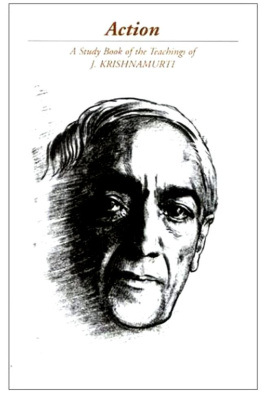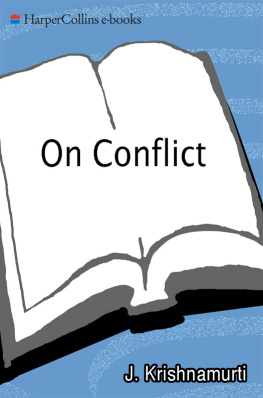Krishnamurti - Beyond Violence
Here you can read online Krishnamurti - Beyond Violence full text of the book (entire story) in english for free. Download pdf and epub, get meaning, cover and reviews about this ebook. publisher: Krishnamurti Foundation India, genre: Religion. Description of the work, (preface) as well as reviews are available. Best literature library LitArk.com created for fans of good reading and offers a wide selection of genres:
Romance novel
Science fiction
Adventure
Detective
Science
History
Home and family
Prose
Art
Politics
Computer
Non-fiction
Religion
Business
Children
Humor
Choose a favorite category and find really read worthwhile books. Enjoy immersion in the world of imagination, feel the emotions of the characters or learn something new for yourself, make an fascinating discovery.

- Book:Beyond Violence
- Author:
- Publisher:Krishnamurti Foundation India
- Genre:
- Rating:4 / 5
- Favourites:Add to favourites
- Your mark:
- 80
- 1
- 2
- 3
- 4
- 5
Beyond Violence: summary, description and annotation
We offer to read an annotation, description, summary or preface (depends on what the author of the book "Beyond Violence" wrote himself). If you haven't found the necessary information about the book — write in the comments, we will try to find it.
Beyond Violence — read online for free the complete book (whole text) full work
Below is the text of the book, divided by pages. System saving the place of the last page read, allows you to conveniently read the book "Beyond Violence" online for free, without having to search again every time where you left off. Put a bookmark, and you can go to the page where you finished reading at any time.
Font size:
Interval:
Bookmark:
Beyond Violence
Copyright 1973 Krishnamurti Foundation Trust Ltd.
BEYOND VIOLENCE
J. KRISHNAMURTI
Authentic Report of Talks and Discussions in
Santa Monica, San Diego, London,
Brockwood Park, Rome
We have built a society which is violent and we, as human beings, are violent; the environment, the culture in which we live, is the product of our endeavour, of our struggle, of our pain, of our appalling brutalities. So the most important question is: Is it possible to end this tremendous violence in oneself?
We are violent. Throughout existence, human beings have been violent and are violent. I want to find out, as a human being, how to transcend this violence, how to go beyond it. What am I to do? I see what violence has done in the world, how it has destroyed every form of relationship, how it has brought deep agony in oneself, miseryI see all that. And I say to myself, I want to live a really peaceful life in which there is a deep abundance of loveall the violence must go. Now what have I to do?
CONTENTS
TALKS AND DISCUSSIONS
Talks in Santa Monica, California, March 1970
Technologically, man has advanced incredibly, yet he remains as he has been for thousands of years, fighting, greedy, envious, burdened with great sorrow.
Unless the mind is absolutely free from fear, every form of action brings about more mischief, more misery, more confusion.
Change in society is of secondary importance; that will come about naturally, inevitably, when you as a human being bring about this change in yourself.
Religion, then, is something that cannot possibly be put into words; it cannot be measured by thought...
Talks in San Diego State College, April 1970
Can you observe without the centre, not naming the thing called fear, as it arises? It requires tremendous discipline.
As long as the me survives in any form, very subtly or grossly, there must be violence.
If you have this extraordinary thing going in your life, then it is everything; then you become the teacher, the disciple, the neighbour, the beauty of the cloudyou are all that, and that is love.
Talks in London, May 1970
The very process of control breeds disorder; just as the oppositelack of controlalso breeds disorder.
Truth is not what is, but the understanding of what is opens the door to truth.
The religious mind is a light to itself. Its light is not lit by anotherthe candle that is lit by another can be put out very quickly.
Talks in Brockwood Park, September 1970
A mind that is caught up in knowledge as a means to freedom does not come to that freedom.
For the stillness of the mind, its complete quiet, an extraordinary discipline is required;... the mind then has a religious quality of unity; from that there can be action which is not contradictory.
Talk in Rome, October 1970
Seeing this vast fragmentation both inwardly and outwardly, the only issue is that a human being must radically, profoundly, bring about in himself a revolution.
T ALKS IN S ANTA M ONICA , C ALIFORNIA , M ARCH 1970
Existence
Technologically, man has advanced incredibly, yet he remains as he has been for thousands of years, fighting, greedy, envious, burdened with great sorrow.
I would like to talk about the whole problem of existence. Probably you know as well as the speaker what is actually taking place in the worldutter chaos, disorder, violence, extreme forms of brutality, riots ending up in war. Our lives are extraordinarily difficult, confused and contradictory, not only in ourselves, inside the skin as it were, but also outwardly. There is utter destruction. All the values are changing from day to day, there is no respect, no authority, and nobody has faith in anything whatsoever; neither in the Church, nor in the establishment, nor in any philosophy. So one is left absolutely to oneself to find out what one is to do in this chaotic world. What is the right action?if there is such a thing as right action.
I am sure each one of us asks what is the right conduct. This is a very serious question, and I hope those of you who are here are really serious, because this is not a gathering for philosophical or religious entertainment. We are not indulging in any theory, in any philosophy, or bringing from the East some exotic ideas. What we are going to do together is to examine the facts as they are, very closely, objectively, non-sentimentally, unemotionally. And to explore in that way, there must be freedom from prejudice, freedom from any conditioning, from any philosophy, from any belief; we are going to explore together very slowly, patiently, hesitantly, to find out. It is like good scientists looking through a microscope and seeing exactly the same thing. Because if you are a scientist in the laboratory using a microscope, you must show what you see to another scientist, so that both of you see exactly what is. And that is what we are going to do. There is not your microscope, or the speakers: there is only one precision instrument through which we are going to observe and learn in the observationnot learn according to your temperament, your conditioning, or to your particular form of belief, but merely observe what actually is, and thereby learn. And in the learning is the doing; learning is not separate from action.
So what we are going to do first is to understand what it means to communicate. Inevitably we have to use words, but it is much more important to go beyond the words. Which means that you and the speaker are going to take a journey of investigation together, where each one of us is in constant communion with the other; that is sharing together, exploring together, observing together. For that word communication means partaking, sharing. Therefore there is no teacher or disciple, there is not the speaker to whom you listen, either agreeing or disagreeingwhich would be absurd. If we are communicating, then there is no question of agreement or disagreement, because both of us are looking, both of us are examining, not from your point of view, or from the speakers point of view.
That is why it is very important to find out how to observe, how to look with clear eyes, how to listen so that there is no distortion. It is your responsibility as well as the speakers to share together; we are going to work together. This must be very clearly understood from the beginning: we are not indulging in any form of sentimentality or emotionalism.
If this is clear, that you and the speaker, being free from our prejudices, from our beliefs, from our particular conditioning and knowledge, are free to examine, then we can proceed, bearing in mind that we are using a precision instrumentthe microscopeand that you and the speaker must see the same thing; otherwise it will not be possible to communicate. As this is a very serious matter, you must not only be free to examine it but free to apply it, free to test it out in daily life; not keep it merely as a theory or as a principle towards which you are working.
Now let us look at what is actually going on in the world; there is violence of every kind, not only outwardly but also in our relationship with each other. There are infinite nationalistic and religious divisions between people, each against the other, both politically and individually. Seeing this vast confusion, this immense sorrow, what are you to do? Can you look to anybody to tell you what to do: to the priest, to the specialist, to the analyst? They have not brought about peace or happiness, joy, freedom to live. So where are you to look? If you assume the responsibility of your own authority as an individual, because you no longer have any faith in outward authoritywe are using the word authority advisedly in a particular sense of that wordthen you as an individual, will you look for your own authority inwardly?
Font size:
Interval:
Bookmark:
Similar books «Beyond Violence»
Look at similar books to Beyond Violence. We have selected literature similar in name and meaning in the hope of providing readers with more options to find new, interesting, not yet read works.
Discussion, reviews of the book Beyond Violence and just readers' own opinions. Leave your comments, write what you think about the work, its meaning or the main characters. Specify what exactly you liked and what you didn't like, and why you think so.









